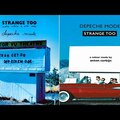Usually, when reviewing an album for XS Noize, I’m obliged to give a rating out of ten to reflect how I feel about it. Whenever I am considering how an album rates on that scale, Violator by Depeche Mode is the benchmark I use as, in my opinion it is simply the finest album ever made. I don’t work to an “out of ten” scale, I work to a “how does this measure up to Violator” scale. This article doesn’t need a score as it is part of the site’s classic albums series but suffice to say that if I did have to score it, 10 wouldn’t be enough.
Released on 19 March 1990, 25 years to the day that I am writing this, Violator is recognised by many Depeche Mode fans as their best album. Interestingly, it is also the album many other bands see as the band’s highpoint including the likes of the Pet Shop Boys who talked about Violator being an album which “raised the stakes” and on they were “deeply jealous of.” Of all Depeche’s albums, it is the one that garners the most praise, respect and adulation and its influence continues to be felt today.
Following 1987/88’s Music For The Masses tour, which of course culminated in the band’s landmark gig at the Rose Bowl, Depeche Mode were poised to become one of the world’s biggest bands. In 7 years, they’d gone from Dreaming Of Me to playing to 65,000 people in America and during that time they didn’t compromise their approach or sound; they instead built their own style and feel, taking electronic music from the small clubs they started in to the world’s arenas and stadiums. The Black Celebration and Music For The Masses albums focused on love and lust as lyrical themes and wrapped them in music that was challenging in places but ultimately still had a pop hook. Violator removed the more challenging aspects of the band’s sound and replaced them with an accessibility without compromising and in doing so, invented gothic-soul or electronic blues or stadium synth or whatever label you want to put on it. Violator changed everything, not only for Depeche Mode, but also for electronic music.
The band kicked off the album’s production by changing their demo approach. Instead of Martin presenting fully formed songs as he would usually do, he was asked to produce sparser tracks to allow the band to work them up in the studio. Enjoy The Silence for example, was presented to the band as a slow track with only Martin’s voice and a harmonium backing it. After three weeks programming work in producer Flood’s studio, the band first moved to Logic Studios in Milan where only Personal Jesus was really worked on, before relocating to PUK in Denmark where the album was completed. Lyrically, Martin focusses on love, lust, guilt, sin and redemption and the production team of Alan Wilder and Flood, together with Francois Kervorkian on mixing duties, envelop those themes in music that enhances them, producing an album that is bewitching throughout its 47 minutes and 2 seconds (yes I even know the running length off by heart).
Opener World In My Eyes starts the album off with a feast of precise electronics, beats and rhythm and it re imagines Depeche Mode as Kraftwerk with its cool precision. Depeche hadn’t sounded like this before. There is something about the song that just sounds so clean and crisp and the fact that it still sounds that way today says so much for the way it was produced. The band opened every show on the World Violation tour in 1990 with this song and it’s still a fan favourite live, with each rendition seeing thousands of fans holding their hands up mirroring the pose the band use on the single version’s different covers. Like most of Violator, the song’s lyrics are firmly bedroom based, but World In My Eyes doesn’t focus on guilt or sin as is apparent from one listen. What an opener. What a statement of intent.
Sweetest Perfection follows and it is the first of the album’s two tracks sung by Martin Gore. Opening with a shuffling, almost military like drumbeat, the song expands into a mix of swirling electronics and treated guitars with layer upon layer of sounds being added until the song reaches its mesmerising climax. Like, say, In Your Room from Songs Of Faith And Devotion, Sweetest Perfection is a great example of Alan Wilder and Flood’s ability to build a Depeche Mode song and create something special. The song has an intensity that the robotic pop of World In My Eyes doesn’t; the latter’s crisp beauty replaced by the former’s atmospheric depth. Magically, the song ends with Dave Gahan singing counter melody to Martin’s lead which, even now, still takes the breath away.
So how do you follow that? Well, if you’re going to place something as track three to follow two of the greatest opening tracks in history, you’re going to have to do something impressive. That was no problem for Depeche Mode – track three is Personal Jesus. I presume that if you are reading this post on here, you are a fan of music generally, so you will have heard Personal Jesus and I don’t think there’s a great deal I can say about it that hasn’t already been said. This track was the lead single from the album and was released on 29 August 1989, only 14 months after the Music For The Masses tour ended. It surprised everyone with its combination of glam rock electronics and prominent bluesy guitar riff and, of course, caused some controversy with its not actually that controversial lyrics. It’s one of two tracks on this album (Enjoy The Silence being the other) that have an appeal far beyond the Depeche Mode fan base and the subsequent covers by artists as diverse as Johnny Cash and Marilyn Manson speak to its enduring appeal. As an aside, you really should hear Johnny Cash’s version which is sparse and hauntingly beautiful. I wouldn’t worry too much about Marilyn Manson’s take. For Violator, the song is remixed from the single version with a section from the Holier Than Thou mix from the cd single and 12” being added on the end to marvelous effect.
Halo, the album’s fourth track, is simply one of the greatest things anyone has ever done. If you ever want to give anyone an example of how electronic music can produce some of the most moving, soulful music you can hear, play them Halo. The song is everything that is good about Violator distilled into one track. The lyrics speak of love being the most important thing in the world, something to be preserved at all costs (“And when our worlds they fall apart/When the walls come tumbling in/Though we may deserve it/It will be worth it”) and the music…oh that music. Stirring, emotional, brooding, almost but never quite over the top. It is a song that is impossible to adequately describe here. Halo is a landmark Depeche Mode track and one that fully justifies any praise this album receives. A trainspotter fact for you all is that Halo features a sampled drum break from Led Zeppelin’s When The Levee Breaks though it was first sampled from a thus far unnamed rap record by Alan and Flood.
Next up we have Waiting For The Night which is, in part, a duet by Dave and Martin, and their beautiful rendition on the World Violation Tour is a joy to listen to. Commencing with raindrop like arpeggiated synths, the song, like Sweetest Perfection builds and builds to irresistible ending that sees Martin’s voice sampled and altered in pitch to harmonise with himself. I don’t want to keep using words like atmospheric but the atmosphere created with this song is the key thing here and it is a captivating, stunning atmosphere. It ends what was side 1 of the record/cassette perfectly.
Seeing as we’re talking in those terms, Side 2 kicks off with what I maintain is the best song of all time and it is one that not only got me into Depeche Mode, but also changed how I hear music. I know the same can be said for many Depeche fans and, as well as the Devotees, the song also bewitched millions worldwide, becoming Depeche Mode’s most popular song. Enjoy The Silence is the quintessential Depeche Mode track. As I mentioned earlier, the song began life as Martin’s harmonium based demo but Alan and Flood saw its potential as a hit and added the iconic guitar part, beats and more to create a masterpiece. The music combined with Anton Corbijn’s standout video gave Depeche Mode a whole new audience. The song was the album’s second single and was released prior to Violator. Its impact meant that this album was anticipated like no Depeche Mode album before and, no doubt, was a crucial component to Violator’s success. Like Personal Jesus, Enjoy The Silence has a ubiquity that few other Depeche tracks do, so I don’t need to describe it or talk about it at length. If you haven’t heard it, you really should. In a way, I’m jealous of you as I guarantee you that your first listen to Enjoy The Silence will be something very special indeed.
Enjoy The Silence ends with a curious piece of music that is unnamed on the album’s sleeve. It is a brief interlude called Crucified which, fact fans, features Andy Fletcher on vocals (one word only – “Crucified” which is treated and distorted) and Dave Gahan on guitar. It was also used as the intro music on the World Violation Tour, mixed in with instrumental Kaleid which was of course the B-side to the album’s third single, and track 7 on Violator, Policy Of Truth.
Policy Of Truth is one of the more straightforward pop style songs on the album albeit it retains the album’s absorbing feel. Lyrically, we’ve now moved into the regret stage with the song chiding a former lover for lying once again (“Never again is what you swore/The time before”) and musically this is the album’s most strident part moment with thudding beats and loud, sampled guitars prominent in the mix. The main riff is a masterpiece of Depeche synth riff simplicity with its 3 notes amongst the band’s most memorable. Policy Of Truth is one of these tracks that some DM fans get bored of live because they feel it’s played too often and more obscure, hardcore fan base tracks should be played in place of it, but I say that’s nonsense. Policy Of Truth is a glorious track and is a classic Depeche Mode single.
The album’s penultimate track is the second Martin Gore lead vocal and finds us in Martin’s bedroom watching something that we really shouldn’t be watching. Blue Dress is a love song, albeit as Martin says, a “pervy” one. It is a beguiling wonder of a track, encompassed by swirling electronics and more treated guitars. Like Sweetest Perfection, the track has a woozy, almost drunken feel that draws you in and doesn’t let you go. There are only two verses and the song has a looped almost repetition like feel that transfixes you from the off. It’s very much one of my favourite Martin sung tracks.
A brief musical interlude, fittingly called Interlude No. 3 follows before the album’s closer Clean kicks in. A bass line heavily…ahem…influenced by Pink Floyd’s One Of These Days opens the track before Dave’s vocals arrive whereupon he sings of being clean or free from something that has haunted him for years. One of the album’s many production highpoints is Dave’s vocal in which you can hear him take breaths before most lines which serves to intensify the song’s mood. Again, Alan and Flood build and layer the song throughout and it is a perfect closing track to a perfect album.
And there we have it – the end. Violator saw Depeche Mode become one of the world’s biggest bands and the subsequent World Violation tour filled arenas and stadia worldwide. They sold out Dodgers Stadium in Los Angeles which itself is remarkable, but what makes it even more impressive is that they did so a mere eight years after releasing The Meaning Of Love. Actually no, what actually makes it more impressive is that they did so, like I said earlier, without compromise and entirely on their own terms. The tour was an astounding spectacle with Anton Corbijn’s films enhancing the already impressive live versions of the songs and it was a tour that the likes of U2 observed closely as it redefined stadium gigs. I should also, of course, mention Anton Corbijn’s artwork for the whole Violator period. The stark, simplistic, iconic beauty of the album sleeve still astounds me to this day and his work on all the single covers, videos and merchandise is a truly wondrous thing. All his work was a key feature of Violator as it gave the whole project an imagery that completed the package. Music as art, art as music.
Even though I’ve quite deliberately not played the album while I wrote this, having written it, I still feel like I do at the end of Violator. I want to put it on again and once again immerse myself in its perfection. I hope you want to do the same too.
Az eredeti cikk itt olvasható: http://www.xsnoize.com/classic-album-violator-by-depeche-mode/






